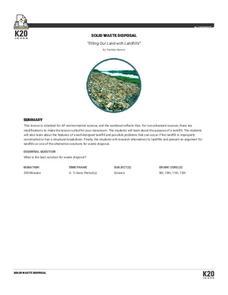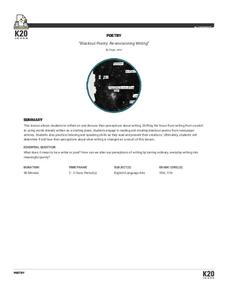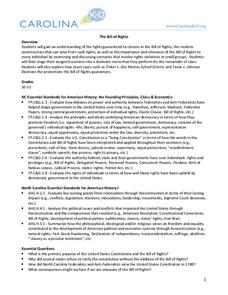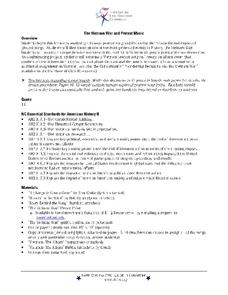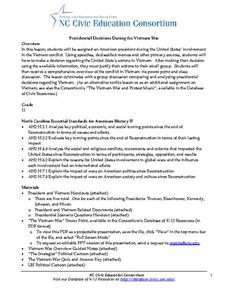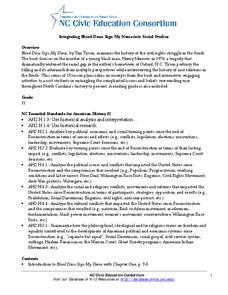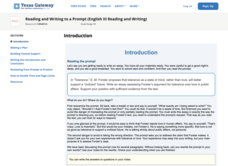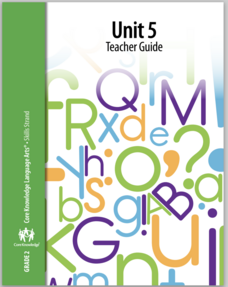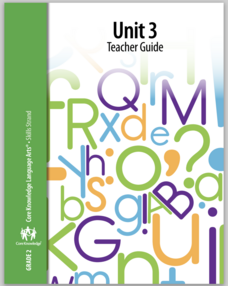Building Evidence-Based Arguments: Grade 9
High schoolers investigate the dilemma of a proportional response with a lesson about the history of terrorism and militant extremists in the United States. As they examine memos from the FBI and speeches from President Bush and Obama,...
K20 Learn
Filling Our Land with Landfills: Solid Waste Disposal
Though it comprises only 5 percent of the world's population, the US generates 40 percent of the world's waste. Scholars learn about landfills, their safety, and other solid waste methods. They use experiments and research to learn more....
K20 Learn
Blackout Poetry: Re-Envisioning Writing
Shed light on the beauty of language with a great poetry activity. After learning about Austin Kleon's blackout poetry model, pupils respond to some of his poetry and use it as a model to produce their own. Young writers also share their...
Carolina K-12
Causes of the American Revolution
Beginning with the experience of hearing that lockers in school will be taxed, through analysis of political cartoons and informational text, and culminating in a debate between loyalists and patriots, your class members will engage in a...
Carolina K-12
Plessy v. Ferguson & the Roots of Segregation
How far in the past do the roots of Jim Crow and segregation extend? Young historians closely consider this question using detailed PowerPoint slides as a basis for discussion rather than lecture, culminating in an activity where class...
Carolina K-12
Factors of Production and Economic Decision-Making
Class members begin this engaging economics activity by listing all the resources used in producing a car and using that example to draw parallels to the four primary factors of production: capital goods, labor, natural resources, and...
Carolina K-12
What Should President Truman Do?
After reading the article Choices: Truman, Hirohito, and the Atomic Bomb, class members engage in a simulation, assume the role of President Truman or one of his advisors and discuss the options open to the president. The exercise...
Carolina K-12
The Major Conferences of World War II
Young historians create a 1940's news radio broadcast on the five major World War II conferences, including the Atlantic, Casablanca, Tehran, Yalta, and Potsdam.
Center for Literacy and Disability Studies
The Bill of Rights
Explore the Bill of Rights in-depth with this resource packet that includes the complete text of the document, scenarios and discussion questions for each amendment, role-playing activities, exercises, questions for a Socratic seminar, a...
Carolina K-12
The Vietnam War and Protest Music
Here's a must-have resource for your Vietnam War curriculum file. Class members view a PowerPoint that details the background of the conflict and then examines the reasons for and the effects of protest songs on American attitudes toward...
Winnipeg School Division Numeracy Project
Dot Card and Ten Frame Activities
What fun, simple number value activities these are! Using dot cards and ten frames, 34 educational games are briefly described to help diversify these great strategies. For example, in the game "I Wish I Had..." the teacher holds up a...
Carolina K-12
Comparing Economic Systems
How do people make decisions in a world where wants are unlimited but resources are not? How do individuals and governments utilize scarce resources (human, natural, and capital) in different economic systems? Introduce your learners to...
University of North Carolina
The Narrative of the Life of Frederick Douglass, an American Slave
After reading excerpts from Frederick Douglass' autobiography, pupils will draw on what they've learned about the cruelty of slavery to write and present an anti-slavery speech or editorial.
University of North Carolina
Presidential Decisions During the Vietnam War
To begin a study of the Vietnam War, groups assume the role of a US president, examine primary source documents, and based on this limited information, must decide on the United States' actions during the Vietnam War.
University of North Carolina
Integrating Blood Done Sign My Name into Social Studies
Tim Tyson's Blood Done Sign My Name is the anchor text in a unit study of the history of race relations and the civil rights struggle in the South. The 11 lessons are richly detailed, and the unit deserves a space in your curriculum...
Texas Education Agency (TEA)
How to Read and Analyze a Poem (English III Reading)
A poem is compressed speech, like a can of frozen juice with all the water pressed out. An interactive teaches users how to reconstitute the language, the structure, and the literary devices to appreciate all the subtleties the poet...
Texas Education Agency (TEA)
Reading and Writing to a Prompt (English III Reading and Writing)
Learning to read and write in response to a prompt is an essential skill. Users of this interactive learn how to analyze a writing prompt to determine the many facets that must be addressed, how to plan and structure a response, and how...
Utah Education Network (UEN)
Hamlet Soliloquy Artwork
Though this assignment may be thought madness, there is an actual method. Scholars perform a close reading of the original text of the soliloquies in Hamlet and modern translations to ensure they understand the speeches. They then select...
National Woman's History Museum
Stacey Abrams: Changing the Trajectory of Protecting People’s Voices and Votes
In this project-based learning lesson, young social scientists investigate Stacey Abrams' campaign to protect the voting rights of people across the nation. Investigators learn how to annotate assigned articles, watch videos, and collect...
Core Knowledge Foundation
Second Grade Skills Unit 6: The War of 1812
An English language arts unit closely examines spelling, grammar, reading, and writing skills. Scholars practice spelling patterns and tricky words. A read-aloud details the War of 1812 and introduces adverbs, and a close reading looks...
Core Knowledge Foundation
Second Grade Skills Unit 5: Sir Gus
A unit focuses on second-grade skills, specifically spelling, grammar, writing, and reading. Over six weeks, scholars review spelling patterns and tricky words, and explore verb tenses, adjectives, subjects, and predicates. They write...
Core Knowledge Foundation
Second Grade Skills Unit 4: The Job Hunt
Second graders practice skills, including spelling, grammar, and reading. Pupils examine vowel sounds and tricky words, nouns, and verbs. They begin the writing process by drafting a persuasive letter and decoding texts.
Core Knowledge Foundation
Second Grade Skills Unit 3: Kids Excel
The unit offers second graders skills practice in tricky spelling and words, grammar—nouns and punctuation, reading decodable texts, and writing a personal narrative. Lessons begin with a warm-up and go into a concept review, word work,...
Core Knowledge Foundation
Second Grade Skills Unit 2: Bedtime Tales
A unit covering second-grade skills reviews 16 letter-sound correspondences, tricky words, and punctuation. Readers provide context for examining story elements, and pupils participate in close reading and write narratives retelling a...



